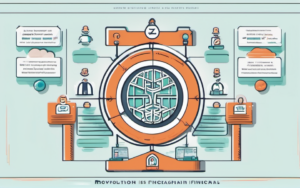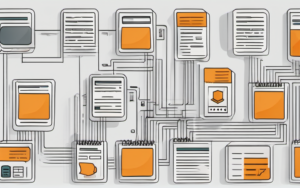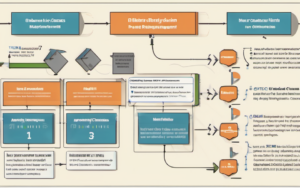Blockchain record keeping is rapidly transforming how organizations manage and store data. Its decentralized, secure, and transparent nature offers significant advantages over traditional methods, promising a more efficient and reliable future for record management. However, challenges remain before widespread adoption can be achieved. This detailed exploration examines the long-term viability of blockchain for record keeping, weighing its benefits against potential limitations.
1. Introduction
1.1 The Rise of Blockchain Technology
Blockchain technology, initially known for its role in cryptocurrencies like Bitcoin, has evolved beyond its financial origins. Its underlying architecture, a distributed ledger system, offers a unique solution to various data management challenges. This innovative technology has captured the attention of numerous industries, promising a revolution in data security and transparency. The decentralized nature of blockchain makes it inherently resistant to single points of failure, a significant improvement over centralized systems vulnerable to hacking or data corruption.
1.2 Blockchain’s Potential in Record Keeping
The potential of blockchain in record keeping is immense. Imagine a world where all records, from medical files to land titles, are securely stored on an immutable ledger, accessible only to authorized parties. This vision is driving significant investment and research into blockchain-based record keeping systems. The inherent security and transparency offered by blockchain could significantly reduce fraud and streamline various processes. The long-term impact of blockchain on data management systems is likely to be profound.
1.3 Scope of this Discussion
This discussion will delve into the advantages and disadvantages of using blockchain for long-term record storage, examining its long-term benefits and comparing it to traditional record keeping systems. We will explore real-world applications, address current challenges, and offer insights into the future of blockchain in this crucial area. The focus will be on evaluating the long-term viability of blockchain technology as a primary solution for record keeping.
2. Advantages of Blockchain for Record Keeping
2.1 Enhanced Security and Immutability
Blockchain’s security stems from its cryptographic hashing and decentralized nature. Cryptographic hashing ensures that any alteration to a record is immediately detectable, maintaining data integrity. The decentralized architecture, where multiple copies of the ledger are distributed across a network, makes it highly resistant to tampering or single points of failure. This inherent immutability is a crucial advantage for long-term record storage, ensuring data authenticity and reliability.
The decentralized nature of blockchain further enhances security. Unlike centralized systems, where data is stored in a single location vulnerable to hacking or data breaches, blockchain distributes data across a network, making it significantly harder to compromise the entire system. This feature is particularly relevant when considering the long-term impact of blockchain on data management systems, especially in highly sensitive sectors.
2.2 Increased Transparency and Traceability
Blockchain’s transparency allows authorized parties to access and verify data in real-time. This real-time data access enhances auditability and accountability, creating a more transparent and trustworthy system. Every transaction or record addition is recorded on the blockchain, creating an auditable trail that can be traced back to its origin. This increased transparency benefits various applications, especially those requiring high accountability, such as supply chain management and healthcare records.
This enhanced traceability significantly reduces the risk of fraud and manipulation. The ability to track the entire history of a record, from its creation to its current state, is invaluable for ensuring data integrity and resolving disputes. Considering the long-term benefits of blockchain record keeping, this feature is paramount in maintaining trust and reliability.
2.3 Improved Efficiency and Cost Reduction
Blockchain can automate various processes related to record keeping, reducing manual intervention and associated costs. Automation of processes, such as record creation, verification, and retrieval, reduces administrative overhead. This leads to significant cost savings in the long run. Furthermore, the elimination of intermediaries in some cases can further reduce expenses.
The reduced administrative overhead translates to increased efficiency and faster turnaround times. Tasks that previously required significant manual effort can be automated, freeing up resources for other important activities. The long-term impact of blockchain on data management systems includes a notable increase in operational efficiency and cost optimization. The advantages and disadvantages of using blockchain for long-term record storage must weigh these efficiencies against the initial investment and ongoing maintenance costs.
3. Challenges and Limitations of Blockchain Adoption
3.1 Scalability Issues
One of the major challenges facing blockchain technology is scalability. Transaction throughput and network congestion can become significant limitations as the volume of data increases. Existing blockchain networks struggle to handle the high transaction volumes required for widespread adoption in record keeping. This limitation needs to be addressed before blockchain can be considered a viable solution for large-scale record management systems.
Improving scalability remains an active area of research and development. Solutions such as sharding and layer-2 scaling solutions are being explored to increase the transaction capacity of blockchain networks. Addressing scalability concerns is crucial for realizing the full potential of blockchain for long-term record storage.
3.2 Regulatory Uncertainty and Compliance
Regulatory uncertainty surrounding blockchain technology and its applications poses a significant challenge to its adoption. Data privacy concerns and the lack of clear legal frameworks in many jurisdictions hinder the widespread implementation of blockchain-based record keeping systems. This legal ambiguity creates uncertainty for businesses and individuals considering adopting this technology.
Navigating regulatory hurdles requires collaboration between technology developers, policymakers, and legal experts. Developing clear guidelines and regulations that address data privacy, security, and liability is crucial for fostering trust and encouraging the adoption of blockchain for record keeping. The long-term impact of blockchain on data management systems depends heavily on the resolution of these regulatory issues.
3.3 Interoperability and Standardization
Lack of uniform protocols and data exchange challenges hinder the interoperability of different blockchain platforms. This lack of standardization makes it difficult to integrate blockchain-based record keeping systems with existing IT infrastructure. This interoperability issue is a key concern for businesses looking to adopt blockchain technology without disrupting their current operations.
Addressing this challenge requires industry-wide collaboration to develop common standards and protocols. Without interoperability, blockchain’s potential for widespread adoption in record keeping will remain limited. The comparing blockchain vs traditional record keeping systems long term requires considering this critical aspect of interoperability.
4. Case Studies and Real-World Applications
4.1 Supply Chain Management
Blockchain is revolutionizing supply chain management by providing secure and transparent tracking of goods throughout their journey. This enhanced traceability improves efficiency, reduces fraud, and increases consumer confidence. Companies are using blockchain to record and verify product origins, ensuring authenticity and preventing counterfeiting.
4.2 Healthcare Records Management
Secure and efficient management of healthcare records is a critical application of blockchain. Patients can have greater control over their medical data, while healthcare providers can share information securely and efficiently. The immutable nature of blockchain ensures the integrity and confidentiality of sensitive patient data.
4.3 Land Registry and Property Records
Blockchain technology is being explored for managing land registry and property records. This improves transparency and reduces the risk of fraud and disputes. The decentralized and secure nature of blockchain makes it an ideal solution for managing valuable assets like land and property.
5. Future Trends and Predictions
5.1 Advancements in Blockchain Technology
Advancements in blockchain technology, such as improved scalability solutions and enhanced privacy features, are paving the way for wider adoption. Research and development efforts are focused on addressing the current limitations and unlocking the full potential of this transformative technology.
5.2 Growing Adoption Across Industries
We expect to see increasing adoption of blockchain across various industries, as businesses recognize its potential for improving efficiency, security, and transparency. More innovative applications are likely to emerge, further expanding the use cases for blockchain in record keeping.
5.3 Potential for Hybrid Models
The future may see the emergence of hybrid models that combine the benefits of blockchain with traditional database systems. This approach addresses the limitations of current blockchain technology while leveraging its strengths. Hybrid models offer a practical solution for organizations seeking to gradually incorporate blockchain into their record-keeping infrastructure.
The long-term outlook for blockchain in record keeping is positive. While challenges remain, ongoing advancements and increasing adoption indicate a promising future for this transformative technology. The advantages of blockchain’s enhanced security, transparency, and efficiency outweigh the current limitations, paving the way for a more secure and efficient future of record management. The continued development and refinement of blockchain technology will likely lead to its widespread adoption across diverse industries, ultimately revolutionizing how we manage and store valuable data.




